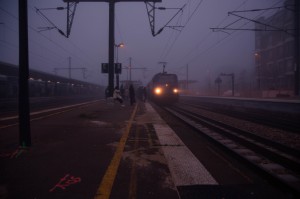Playlist #21: Soundtrack to your life
Adam Scovell on the soundtrack to the movie of his life…
When wandering the streets with my reality blockers (or headphones as some people call them) on full, it becomes extremely easy to imagine that the visual aspect of what I’m seeing is merely an illusion. There are many different reasons why film is scored with music but one key to its success is building up an emotional resonance within the viewer in order for them to care.
Though perhaps listening to a piece of film music while out and about may not always induce some form of virtual reality, great film music is a basic pleasure and an art form in its own right. With this in mind, this playlist has been put together of some of the more unusual and interesting pieces of music composed for film from all corners of the globe, i.e. this is a John Williams free zone (as much as I adore his scores) but also one with music great for listening when out and about.
First up is the compulsory inclusion of a Bernard Herrmann score. The temptation to choose his “All The Animals Come Out At Night” motif that soundtracks the dreamy sequences from Martin Scorsese’s Taxi Driver (1976) was overridden by the fact that it isn’t online without the dialogue. That’s not to say his theme from Vertigo (1958) is any less worthy. Perhaps one of the most exciting and Wagnerian scores of his work, this track comprises of the foreboding introduction music that hints at both the darkness and the tragedy yet to come in the film, while also slipping in the rooftop chase motifs that relentlessly repeat, highlighting the unrelenting fear that Scotty (James Stewart) is drowning in, hanging several stories up from a building.
Next is the wonderfully timeless waltz by Shigeru Umebayashi for the haunting In the Mood for Love (2000). I came to this music before I viewed the film and it’s a piece that can easily stand its ground without need of the visuals (which are gorgeous anyway). Using a very classical form to soundtrack a film about the past means that the film also handily avoided any dated ideas or clichés about the era it was trying to represent and this of course makes Yumeji’s Theme a very clever non-diegetic tool.
Werner Herzog is an extremely experimental director when it comes to scoring his films. His choices of composer and music speak of a desire for originality and perfection. Popol Vuh’s score for Aguirre: Wrath of God (1972) is a perfect example of this and adds an epic feel to the staggering visuals of the party of Spanish Conquistadores traversing down the side of a South American mountain side.
Along similar lines of relaxing but experimental electronica is Edward Artemiev’s score for Andrei Tarkovsky’s Stalker (1979). It reflects the stark beauty of The Zone the film surrounds but also hints at subtle dangers lurking in the long grass of this forbidden place while mixing traditional sounds in with cutting edge electronica.
Coming back home to the U.K in the form of Roy Budd’s score for Get Carter (1971), we find the first of two kitsch inclusions in this playlist. The obvious dating adds to its gritty quality and demonstrates some extremely subtle themes for what is a gangster film. There are also some fantastic keyboard skills on show, with a Bach-like feel and execution, only with added grooves.
The second of the deliberately kitsch scores follows with some of the themes from Jean-Luc Godard’s Breathless (1960). Though of course the score is still wonderfully inventive, it is something that dates it rather than being timeless. It does however typify that special Godard cool which oozes from most of his film’s scores.
Back to Britain again for Willow’s Song from Robin Hardy’s superb The Wicker Man (1974). This song, by Paul Giovanni, works as wonderful little folk tune akin to John Martyn or Nick Drake. It accompanies one of the defining scenes from the film, though is perhaps sometimes ignored for the fact that Britt Ekland is dancing around naked in the scene. Being the story of a man who gets burned at the stake for not having sex with Britt Ekland though, this is easily the most important piece of music in the film.
Much has been stated about Japanese director Akira Kurosawa being quite a western director, though the opening music from his classic Yojimbo (1961) shows a balance of both eastern and western values. Masaru Sato’s music has been the subject of a recent essay of mine and one that has a confident, almost Henri Mancini feel to it mixing western tonality with eastern instrumentation to brilliant effect.
Vangelis was the true winner at this year’s Olympics with his music being played over and over again. How much better would it have been though if when the Olympians had won, instead of the constant playing of Chariots of Fire (1981), Memories in Green or even Blade Runner Blues played instead? His soundtrack for Ridley Scott’s Blade Runner (1982) is one of the best of the 1980s and is full of beautiful and aptly, emotional electronic music; Memories in Green being the best piece from the soundtrack.
The playlist ends with a touching theme from Francois Truffaut’s The 400 Blows (1959). The music has a lullaby quality to its poignant string sections that represent the aimless youth of the film’s central character perfectly. It’s also a wonderful piece of music to end the playlist with and sharing a similar ending with one of the greatest final scenes in the whole of cinema can’t be too bad a thing.
Adam Scovell





